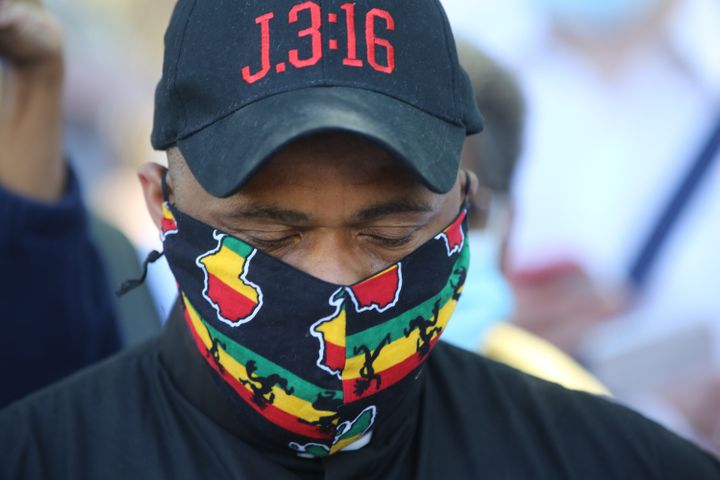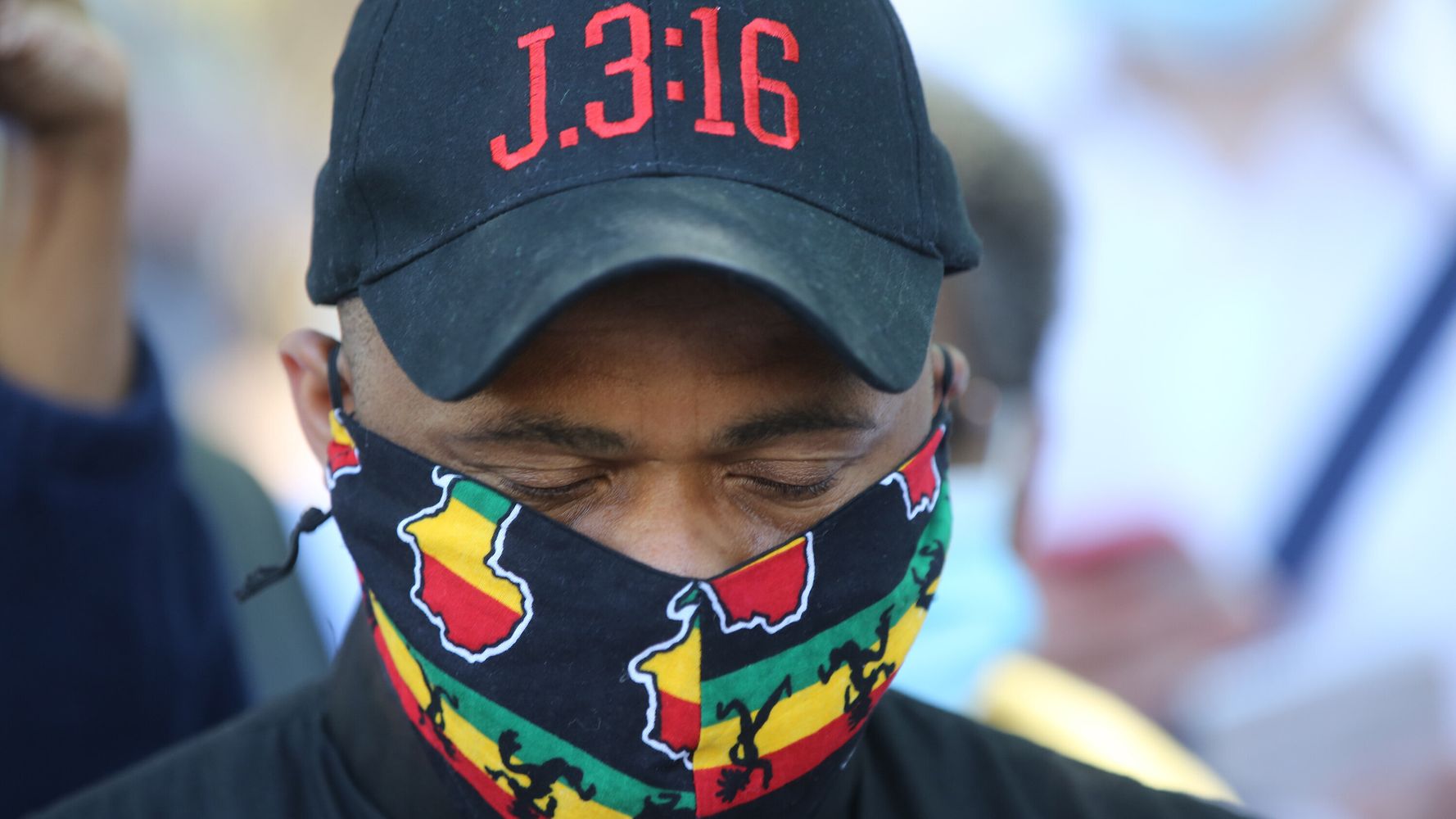[ad_1]
As protestors poured into Washington to demonstrate against racism last week, Rev. Cornelius Kelechi Ejiogu, one of the city’s Roman Catholic priests, worried that the Catholic Church was staying silent at a time when it should be part of the movement, as well, offering a peaceful presence on streets filled with “so much pain.”
Ejiogu’s vision for a “prayerful” Catholic protest came to fruition on Monday, as bishops, priests, nuns, friars, and laity gathered near the White House to “pray for the soul of George Floyd and the soul of America.”
The march, organized by Ejiogu and fellow priests with the blessing of Washington bishops, was meant to encourage dialogue within the U.S. Catholic Church on how to address “systemic racism,” Ejiogu told HuffPost.
“We have a prophetic voice as a church and we want to use that voice and say let there be peace in this country,” said Ejiogu, the pastor of St. Luke Roman Catholic Church, located a few miles east of the U.S. Capitol.

Jesus would say that all lives matter, Ejiogu said. At the same time, the racism that Black communities face should not be ignored, he added.
“We as the Catholic church should be comfortable with saying Black Lives Matter because a whole bunch of folks who have died and lost their lives through police brutality, a whole bunch of them are African Americans,” he said. “We are saying Black people’s lives matter, just like all lives matter.”
Ejiogu said that he believes this is “fundamentally a pro-life issue.” The church teaches that life must be protected from conception until “natural death,” he said, which means Catholics shouldn’t be silent about the May 25 police killing of George Floyd in Minneapolis that sparked the ongoing nationwide protests, as well as the deaths of other Black Americans at the hands of law enforcement officers
“As a church, we can’t just be pro-life for unborn children. What about when they are born? We still have to protect their lives,” he said.
Monday’s march began with prayer at Lafayette Square, a park directly across the street from the White House that has become a gathering place for demonstrations over the killing of the unarmed Floyd, who died after a white Minneapolis police officer kneeled on his neck for nearly nine minutes.
On June 1, President Donald Trump’s administration used federal police to forcefully disperse a protest in front of St. John’s Episcopal Church at Lafayette Square. That cleared the way for Trump posed for a photo op in front of the building, which had been damaged during earlier demonstrations.
Washington’s Catholic Archbishop Wilton Gregory ― America’s only Black archbishop ― harshly condemned Trump’s action. Gregory also criticized a visit the president and his wife made the next day to Washington’s Saint John Paul II National Shrine.
Washington has one of the nation’s largest Black Catholic populations. Ejiogu, whose parish is predominantly Black, is a member of The Society Of St. Joseph Of The Sacred Heart, also known as the Josephites, a Baltimore-based religious order dedicated to serving Black communities. The order was founded in the late 19th century to evangelize to newly emancipated African Americans.
Ejiogu said he sought and received the blessing of two of Washington’s prominent Black Catholic bishops for the prayer protest ― Bishop John Ricard, the superior general of the Josephites, as well as Auxiliary Bishop Roy Campbell, Jr., who serves as the president of the National Black Catholic Congress.
The Washington archdiocese emailed priests on Friday encouraging them to join Ejiogu’s protest, according to the Catholic News Agency. The archdiocese did not respond to HuffPost’s request to confirm this invitation or comment more broadly on the protest.
Ricard, Campbell and another local prelate, Auxiliary Bishop Mario E. Dorsonville, attended the protest, according to the Catholic Standard, the archdiocese’s newspaper. More than 40 priests and Catholic deacons were reportedly present, along with more than 200 other Catholics, including members of the advocacy groups the Franciscan Action Network and Pax Christi.
Attendees prayed, sang hymns and listened to scripture readings during the protest. They also listened to a speaker recite the names of Black Americans who were victims of police brutality. The protest concluded with more prayer outside the National Museum of African American History and Culture on the National Mall.
Some Catholics reacted negatively to Gregory’s criticism of Trump’s church photo-op, and on Friday the archbishop said the backlash reminded him of the rebukes people directed at Catholic priests and nuns who marched during the civil rights era of the 1960s.
″[People] said, ‘Oh, you shouldn’t be in the political arena, you should be at church,’” Gregory said during a panel on racism organized by Georgetown University.
But, he added, “The church lives in society. The church does not live behind the four doors of the structures where we worship.”
“I think that’s a key challenge of Pope Francis, to get out of the four walls and get into the world and make a difference, proclaim the gospel … beyond the four walls,” the archbishop said.
The pope addressed the civil unrest in the U.S. last week, decrying both the “sin of racism” and the violent tactics of some protesters.
“We cannot tolerate or turn a blind eye to racism and exclusion in any form and yet claim to defend the sacredness of every human life,” Francis said.
Last week, Bishop Mark Seitz of the Diocese of El Paso, Texas, and several priests kneeled in prayer for Floyd and held Black Lives Matter signs. Francis reportedly called Seitz to thank the bishop for their gesture.
Some white Catholics have a difficult time recognizing systemic racism in law enforcement’s treatment of Black Americans, according to a Public Religion Research Institute survey conducted in the wake of Freddie Gray’s death as he was the custody of Baltimore police in 2015. At that time, about 50% of white Catholics categorized police killings of Black men as isolated incidents, and not part of a broader pattern of how police treat the Black community. More broadly, about 65% of white Americans said these killings did not illustrate systematic racism, while about 81% of Black Americans said the opposite.
Ejiogu told HuffPost that he isn’t advocating for any specific policy to address policy brutality against Blacks ― he just wanted to start a conversation within the church, he said.
“I hope that this begins a serious dialogue in our various parishes,” he said. “I hope that my brother priests will open up the floodgates and allow people to express how we can begin to heal.”
Calling all HuffPost superfans!
Sign up for membership to become a founding member and help shape HuffPost’s next chapter
[ad_2]
Source link

